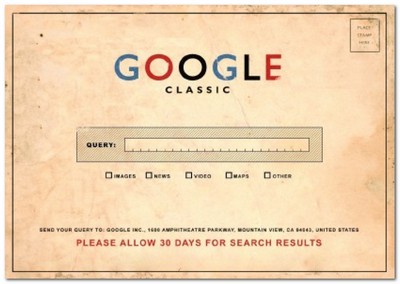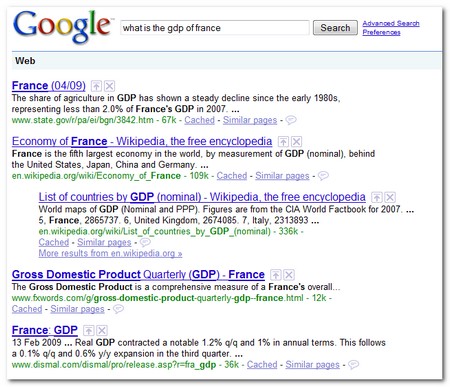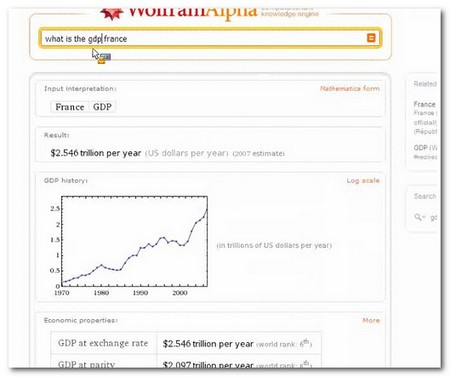The Next Development In Search

Have you seen Wolfram Alpha?
Wolfram Alpha is a search service being released this month that, depending on who you listen to, will either change the internet forever, or provide another useful research tool.
Either way, it does hint at the possible future direction of search services.
Wolfram Alpha hasn't been launched as yet, but you can see some screen shots here. The major difference between Wolfram Alpha and existing search services is that it answers questions, as opposed to returning a list of pages.
For example, a search on "what is the GDP of France" will not only give you a straight answer, is will also bring up a page of related information, complete with graphs and charts.
Compare this with Google's "answer":

By comparison, Google is a step removed from the answer. The onus is still on the searcher to dig for it.
Will Search Engines Becoming Less Passive?
Meanwhile, Google appears to be working on a new, intelligent news distribution system.
When asked by reporter Sharon Waxman, Eric Schmidt confirmed development of a a platform “that will bring high-quality news content to users without them actively looking for it". This news feature would launch in about six months.
Could this be anything more than a glorified RSS reader?
Hard to tell.
However, it may well signal a change in approach from Google being a passive search tool to taking a more active role in data aggregation and channel selection.
When Google says they will not be a content producer, I think this implies they are therefore neutral. However, in the case of Google News, we can see that Google already exerts significant editorial control over the channel, which, at very least, makes them a biased editor, as opposed to neutral.
One criticism of Google News is that it favors content from mainstream media outlets. Whilst Google have included blog search, it is pushed to the back in the form of an archive link. In this respect, Google is very much the friend of the big brand, and the status quo.
Will the new service place control back in the hands of the user? If so, does this present new opportunities for the SEO in the news traffic business?
Schmidt:
The first two news organizations to get this treatment, Schmidt said, will be the New York Times and the Washington Post.
Perhaps not, but certainly a development worth watching.
Where Is Search Heading?
Search is still primitive.
When we use a search engine, are we really looking for a list of sites, or are we looking for answers to questions?
I'd argue we want the latter, but the limits of technology deliver us the former. Wouldn't it be so much better if when we searched for something, we received an answer, and a page of credible, collated data? Much like Wolfram Alpha promises? Is that where search is heading?
In the Future Of Search, Marissa Meyer speculates about active devices that search for data before we're even aware we need it.
It would be much nicer if we had a device with great connectivity that could do searches without interruption. One far-fetched idea: how about a wearable device that does searches in the background based on the words it picks up from conversations, and then flashes relevant facts?
This notion syncs with Eric Schmidt's reported description of Google's new, as yet unreleased, news service:
But Google does have plans for a solution. In about six months, the company will roll out a system that will bring high-quality news content to users without them actively looking for it. Under this latest iteration of advanced search, users will be automatically served the kind of news that interests them just by calling up Google’s page. The latest algorithms apply ever more sophisticated filtering – based on search words, user choices, purchases, a whole host of cues – to determine what the reader is looking for without knowing they’re looking for it.
The common themes are increased levels of personalization, and a more intelligent search service.
What other developments in search will we see in the next few years?





Comments
Conceptually, I like where Wolfram Alpha is going, but wait...wouldn't we actually be taking a step back in having one source of information fed to us as the gospel? How do we know it to be true? In your example, there is a clear-cut answer...What about when there is more than one right answer, like "how do you build a website?" I don't know how this would work for a more esoteric question.
What I could see, is more of a combination of Wolfram Alpha and current search results - they may feed the "answer" at the top of a SERP, and then offer links to surf below it. Google does this a little already (enter in a math equation, like square root of 678).
The Google News idea is just scary...not because they are serving up what they think you want, but that most users will not realize they are seeing these types of results, and will wrongly think the things Goog says are best.They will be best for Google, no doubt.
Like a WHYSIWYG code editor, these seemingly time-saving steps might create more hassles than are immediately apparent. Sigh.
Almost anything official and of value is corrupted. As Senator Durbin recently put it:
So we need to hire professional analyzers who's job is to cleanse government lies out of the data.
Who monitors the professionals that were hired? The next thing we hear about is the professionals are not really professional themselves. Unless there really are people with inner substance we will always be chasing an ideal that never seems to surface. It comes down to the individual and what their inner reference is, more than a government per se.
The Internet is becoming abused by manipulative money driven incentives. I wonder when and if the Internet will return to the good quality substance as was originally intended. Now it is a giant monopoly. The small user, individual site owner, is dwarfed. I am a small user, but if you read the content on websites like this one you get a really good picture. Thank you for being willing to share your knowledge.
I don't feel sorry for any corporation that hired a crappy SEO when I know that people like me exist. If the client was lazy and got duped that is their fault.
And there are quality professionals in the SEO field, but some clients often are so short term focused that even the best consultants can't help them.
Each day each of us makes a choice by choosing what we read, what we link at, what we recommend to friends, and who we buy from. If you want to support sites like this one there are many ways to do it :)
The logo really look like SEOmoz's logo...
My colleagues over in the creative department always tout the idea of catering to the two fundamental types of users:
-need based (know what they want and don't mind searching for it and narrowing down the options on their own)
-solution based (have a general idea of what they want but need to be led down a path)
Perhaps future iterations of search will cater to both of these subsets.
In other words, give me both a straight answer and an option to dig around for additional resources, answers, nuances, etc...
Sounds like fun!
Well searching for options and searching for answers really could be two different search niches. In an industry where 1% of market share is 1 billion dollars, I can see Wolfram or another follower trying to bite some out of the search market. Truly, don't you think Google is starting to have just a little overwhelming search results?
Here is a presentation at Harvard by Stephen Wolfram. It's long but very interesting and explains Wolfram|Alpha as applied in many varied computations: http://www.youtube.com/watch?v=5TIOH80Qg7Q
I used their software alot as a physics student. Kick ass stuff that made beautiful graphs.
Add new comment